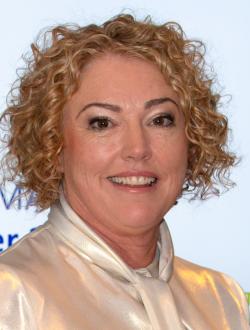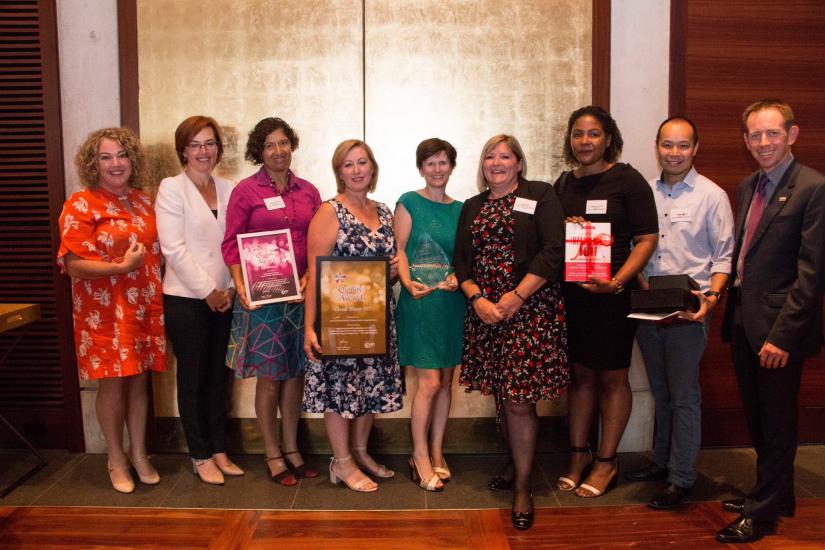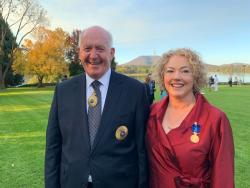
The WHO CC UTS acknowledges use of key language from The WHO Global Strategic Directions for Nursing and Midwifery (2021–2025).
Dying in one’s preferred place remains an elusive aim for most elderly Australians. While everyone has different expectations about what constitutes ‘a good death’, in Australia and globally the rates of elderly people dying in hospitals has increased dramatically over the last 20years. While high quality palliative care is considered a basic human right, most people living in residential care who are nearing death, end up being referred to hospital where they and their family’s emotional, physical and spiritual needs cannot be adequately met.
Nikki Johnstone, OAM MACN, is a Palliative care Nurse Practitioner and has worked in the palliative care sector for over 20 years and witnessed many heartbreaking stories of people being unnecessarily shipped out of residential care facilities at the last minute, either because staff did not recognise the normal signs of dying or the person did not have an advanced care plan.
Dying was happening pretty badly. Care wasn’t great either in the last months of life. We needed a proactive, multidisciplinary model and where the workforce in residential aged care facilities could recognise dying and help families prepare for death, rather than the person ending up in hospital.
In 2019, Nikki won the inaugural Health Minister’s Award for Nursing Trailblazers which recognised her influential work in aged care in Australia. Her research project, INSPIRED, has been recognised internationally and integrates specialist palliative care nurses into residential aged care facilities in Canberra [1]. Her work has overcome some of the existing regulatory barriers which has enabled Nikki and her team to re-shape the delivery of specialist palliative care in the Australian Capital Territory. Nikki’s mantra is:
Everybody should be able to access care no matter who they are, where they live or what’s wrong with them.
Nikki recognised that there were gaps in the health system that were failing these individuals and the health care staff. The number of residents in aged care facilities was continuing to grow, and each facility had a small workforce of carers with high turnover, making it impossible to ensure high quality care for end-of-life residents. Nikki Johnston’s team introduced a new protocol called the ‘Palliative Care Needs Round’ with the aim of improving the experience of elderly people dying in residential aged care facilities.
I’ve always been interested in groups that are particularly vulnerable and don’t really have a voice within the healthcare system.
The INSPIRED trial was the first palliative care research of its kind in the world [2]. The project team conducted a randomised control trial to determine the effectiveness of a new approach where specialist palliative care nurse practitioners were integrated into aged care facilities. Prior to the project, nurses were unable to administer opioids. Now that they are permitted to, more residents have been able to remain in these facilities and avoid hospitalisation. Research lead, Professor Liz Forbat, stated that the research;

demonstrated that this approach enables staff to feel more confident in looking after people at end of life ... The INSPIRED trial indicates residents are enjoying a better quality of life and experiencing less symptoms.

The Palliative Care Needs Round is a three-step conference that runs for an hour and is conducted once a month within the each of 12 aged care facilities. The first round called, ‘case conferencing’, concerns educating staff from all fields within the aged care facility about how to recognise dying, how to recognise pain when residents can’t communicate and to create health plans for each of the individuals living within the facility. This is a great example of up-skilling and re-educating the workforce to adapt to the population needs, through empowering the populace to decide how they wish to pass away.
The next round is the ‘multi-disciplinary case conference’ which, facilitated by Nikki, included families, staff of the facility, residents (if they would like to attend) and VPs. Together with residential staff and residents themselves, families are able to be involved in the decision-making process and develop an advance plan. This people-centred approach encourages nurses to work with civil society, and improve the quality of care and adapt health systems to prepare for the change in health status of their residents.
The third section is the clinical work that recognises the complexity of palliative care and the need to work across multiple sectors of health care in a streamlined approach. This highlighted the fact that referrals to palliative health care need to be triaged to ensure that the most severe cases are well cared for. As a result, during the pilot of the program there was a 67% reduction in hospital stays and a 100% increase of individuals dying in their preferred place [1].
Nikki hopes that the INSPIRED trial will become a nationwide program because it demonstrates the importance of staff working together to provide the best outcome for each patient. Furthermore, the project was found to assist staff in anticipatory prescribing of drugs, better decision making leading to more planned end-of-life care and normalising death and dying. Their project also received a Category Award and was the overall winner of the Quality in Health Care Awards ACT.
Nikki’s dream is to see the pilot program, that she and her team have developed, rolled out across Australia:
It could be done in rural hospitals, because they don’t have aged care in the outback. The case conferencing could be done via telemedicine. We’ve just won 10 000 dollars towards the implementation and we’re partnering with Palliative Care Australia for implementation.
[1] Johnston, Nikki; Lovell, Clare; Lui, Wai-Amn & Forbat, Liz, 2016, ‘Normalising and planning for death in residential care: findings from a qualitative focus group study of a specialist palliative care intervention’, Supportive and Palliative Care 9(1), August 2016.
[2] Hislop, Madeline. 2019,‘ Meet Nikki Johnston: a nursing trailblazer in aged care research’, https://womensagenda.com.au/latest/meet-nikki-johnston-a-nursing-trailblazer-in-aged-care-research/, Women’s Agenda, May 1sr 2019.

